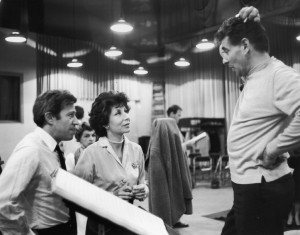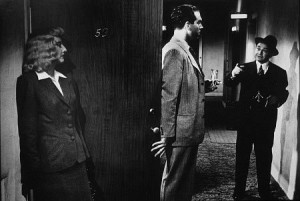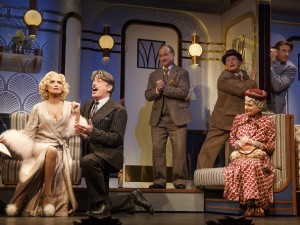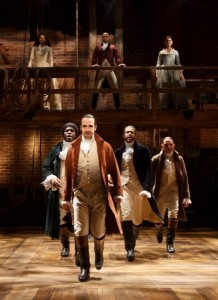 “His whole future seemed suddenly to be unrolled before him; and passing down its endless emptiness he saw the dwindling figure of a man to whom nothing was ever to happen.”
“His whole future seemed suddenly to be unrolled before him; and passing down its endless emptiness he saw the dwindling figure of a man to whom nothing was ever to happen.”
Edith Wharton, The Age of Innocence
Terry Teachout on the arts in New York City
 This is a paragraph from a piece about On the Town that I wrote for a now-defunct magazine called Civilization. I ran across it the other day in my files:
This is a paragraph from a piece about On the Town that I wrote for a now-defunct magazine called Civilization. I ran across it the other day in my files:
I sometimes wonder what inspired Betty Comden, Adolph Green, and Leonard Bernstein to write a song like “Some Other Time.” They were so young in 1944: how could they possibly have known of the quickness with which time robs us of the things we love? I once stood in the hallway of an intensive-care ward, waiting for a friend to die, and the words and music of “Some Other Time” kept running through my head: Where has the time all gone to?/Haven’t done half the things we want to/Oh, well, we’ll catch up/Some other time.
The friend, by the way, was Nancy LaMott. And yes, I still wonder.
* * *
Monica Zetterlund and the Bill Evans Trio perform “Some Other Time” on Norwegian TV in 1965. Chuck Israels is the bassist, Larry Bunker the drummer:
Every fourth week my schedule requires me to hit three separate deadlines: a Wall Street Journal drama column, a “Sightings” column for the Journal, and my monthly essay for Commentary. This is one of those weeks. Sometimes I manage to write and file a piece early, thus relieving the monthly pressure to produce, but I’ve been squeezed of late by various personal responsibilities and so haven’t been able to get ahead of the game.
 On the other hand, I could have written my “Sightings” column last Friday, a day on which I had no places to go or shows to see, and I guess I really should have done so. Instead I chose to lounge around, listen to music, read about Arturo Toscanini and John Dortmunder, and watch a couple of movies on TV with Mrs. T. I am, I suppose, a workaholic, but not a degenerate one. I’m perfectly capable of taking and enjoying time off so long as I make myself do so, and I decided that I’d better do so in preference to burning out. So I did. In fact, I took the whole day off, and was (and am) the better for it.
On the other hand, I could have written my “Sightings” column last Friday, a day on which I had no places to go or shows to see, and I guess I really should have done so. Instead I chose to lounge around, listen to music, read about Arturo Toscanini and John Dortmunder, and watch a couple of movies on TV with Mrs. T. I am, I suppose, a workaholic, but not a degenerate one. I’m perfectly capable of taking and enjoying time off so long as I make myself do so, and I decided that I’d better do so in preference to burning out. So I did. In fact, I took the whole day off, and was (and am) the better for it.
For that reason, though, I won’t be blogging this week, save for the usual videos, almanac entries, and other regular postings. The fruits of my invisible labor will be made manifest starting Friday. Until then, be patient.
See you later.
In today’s Wall Street Journal drama column I review two newly opened Broadway revivals, On the Twentieth Century and The Heidi Chronicles. Here’s an excerpt.
* * *
So you’re looking for a good time? Look no more: The Roundabout Theatre Company’s revival of “On the Twentieth Century” is the best musical to hit Broadway since “On the Town.” Staged with hurtling éclat by Scott Ellis and featuring a jaw-droppingly virtuosic performance by the amazing Kristin Chenoweth, it’s a fluffy exercise in high-octaane pleasure, blessedly devoid of deep thought and certain to satisfy anyone not congenitally po-faced.
 Originally produced in 1978, “On the Twentieth Century” is a musical version of the same stage play that Howard Hawks turned into the classic 1934 screwball comedy in which John Barrymore and Carole Lombard played a monstrously vain director (played here by Peter Gallagher) and the equally egomaniacal ex-protégée (Ms. Chenoweth) whom he is desperately seeking to sign for his next show. “Twentieth Century” didn’t and doesn’t need improving, but if you’re going to write a commodity musical, this is the way to do it: “On the Twentieth Century” sports a book and lyrics by Betty Comden and Adolph Green and a score by Cy Coleman, which is as close as it gets to a money-back guarantee of professionalism.
Originally produced in 1978, “On the Twentieth Century” is a musical version of the same stage play that Howard Hawks turned into the classic 1934 screwball comedy in which John Barrymore and Carole Lombard played a monstrously vain director (played here by Peter Gallagher) and the equally egomaniacal ex-protégée (Ms. Chenoweth) whom he is desperately seeking to sign for his next show. “Twentieth Century” didn’t and doesn’t need improving, but if you’re going to write a commodity musical, this is the way to do it: “On the Twentieth Century” sports a book and lyrics by Betty Comden and Adolph Green and a score by Cy Coleman, which is as close as it gets to a money-back guarantee of professionalism.
Coleman’s score is a knowing pastiche of old-fashioned over-the-top operetta, and Ms. Chenoweth, a full-fledged musical-comedy singer who also has rock-solid operatic chops up to and including a gleaming high C, was born to sing it. On top of all that, she’s a stage comedienne so accomplished that she can make you laugh without singing a note. It’s as if Beverly Sills and Carol Burnett were the same person….
“The Heidi Chronicles,” the 1988 play in which Wendy Wasserstein asked whether a woman can have it all, won it all. Not only did it run for 622 performances on Broadway, but it nailed the trifecta, scooping up the Pulitzer Prize, the best-play Tony, and the New York Drama Critics Circle’s best-play award. Very often, though, that kind of clean-sweep consensus says more about the timeliness of a work of art than about its actual merits. I was struck by how poorly “The Heidi Chronicles” had aged when I saw the Berkshire Theatre Festival’s excellent 2006 production, and the new Broadway revival, directed by Pam MacKinnon and starring Elisabeth Moss, soon to be formerly of “Mad Men,” fails to make a compelling case for taking Wasserstein’s best-remembered play any more seriously today.
Now as then, “The Heidi Chronicles” is a sentimental exercise in punch-pulling that purports to take a tough-minded look at feminism and its discontents but never cuts close to the knuckle of genuine self-doubt. Ms. Moss plays the title character, an art historian born to Ivy League comfort who opts after modest, tenure-cushioned travail for single motherhood over unhappy romance. As did her creator, Heidi lives in a cultural cocoon that insulates her and her like-minded friends—she has no other kind—from the awkward necessity of considering the possibility that they might be wrong about…well, anything. Unlike true satirists, who rock the boat of complacency vigorously and heedlessly, Wasserstein settled for the safe teasing of the uneasy insider who flirts with heterodoxy (“’New Haven’ means ‘Yale’ in Eastern egalitarian circles”) but in the end wouldn’t dream of saying anything really hurtful about the objects of her glib, sitcommy spoofery….
* * *
To read my complete review of On the Twentieth Century, go here.
To read my complete review of The Heidi Chronicles, go here.
Kristin Chenoweth in a scene from the Broadway revival of On the Twentieth Century:
Here’s my list of recommended Broadway, off-Broadway, and out-of-town shows, updated weekly. In all cases, I gave these shows favorable reviews (if sometimes qualifiedly so) in The Wall Street Journal when they opened. For more information, click on the title.
BROADWAY:
• A Gentleman’s Guide to Love & Murder (musical, PG-13, nearly all performances sold out, reviewed here)
• It’s Only a Play (comedy, PG-13/R, closes June 7, reviewed here)
• Matilda (musical, G, nearly all perforamnces sold out, reviewed here)
• Les Misérables (musical, G, too long and complicated for young children, reviewed here)
• On the Town (musical, G, contains double entendres that will not be intelligible to children, reviewed here)
OFF BROADWAY:
• The Fantasticks (musical, G, suitable for children capable of enjoying a love story, reviewed here)
 • Hamilton (historical musical, PG-13, closes May 3, moves to Broadway Aug. 6, reviewed here)
• Hamilton (historical musical, PG-13, closes May 3, moves to Broadway Aug. 6, reviewed here)
IN SARASOTA, FLA.:
• Both Your Houses (political satire, G/PG-13, closes Apr. 12, reviewed here)
• The Matchmaker (romantic farce, G, closes Apr. 11, reviewed here)
CLOSING NEXT WEEK ON BROADWAY:
• Cabaret (musical, PG-13/R, some performances sold out last week, closes Mar. 29, reviewed here)
CLOSING NEXT WEEK OFF BROADWAY:
• Lives of the Saints (six one-act comedies, PG-13/R, closes Mar. 27, reviewed here)
CLOSING SUNDAY IN ORLANDO, FLA.:
• Henry V (Shakespeare, PG-13, reviewed here)
CLOSING SUNDAY OFF BROADWAY:
• Between Riverside and Crazy (drama, PG-13, remounting of off-Broadway production, original production reviewed here)
An ArtsJournal Blog